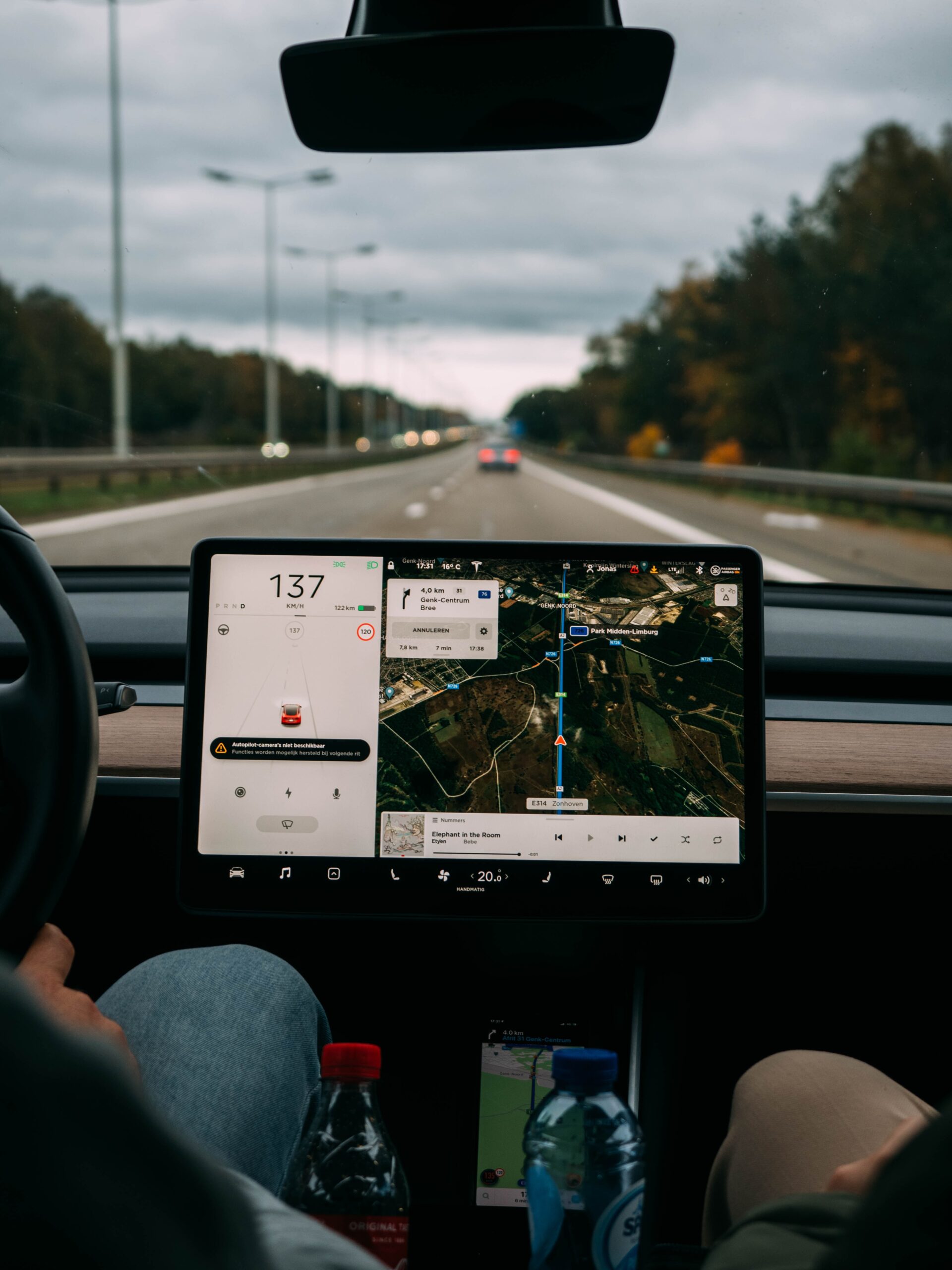Fleet tracking offers numerous benefits to industries in various sectors, enabling them to enhance operational efficiency, reduce costs, improve safety, and comply with regulatory requirements.
In this article, we explore the benefits of vehicle tracking systems in logistics, construction, and public transport, providing real-world examples and case studies to illustrate the impact of solutions tailored to each industry’s unique challenges and demands.
The Benefits of GPS Tracking in Logistics
One of the main aims of logistics is to ensure that goods are transported from one destination to another safely and on time. Getting this right can be a challenge, as logistics companies need to take various factors into account, such as current location, schedules, destination, preferred routes, diversions or unforeseen circumstances on route, traffic, and fuel levels and consumption. Additionally, companies must face the challenges of safety concerns, rising fuel costs, and steep maintenance costs. GPS tracking in logistics can make a quantifiable difference in operations, fuel consumption, safety, and cost savings.
The benefits of fleet vehicle tracking systems in logistics include:
Transforming last-mile delivery: Fleet logistics tracking can positively impact last-mile delivery. Companies can use the data they collect to optimise delivery routes, provide customers with more accurate delivery time estimates, and boost customer satisfaction in response to the growing demand for reliable and fast deliveries.
Improved safety and compliance: Vehicle trackers allow fleet managers to monitor driver behaviour, including compliance with industry regulations and adherence to the rules of the road. Tracking systems can score driver behaviour and audibly alert drivers when they detect bad driving behaviours such as speeding or harsh braking, which can help drivers correct and monitor their driving.
Enhanced operational efficiency: Logistics companies can use the insights provided by fleet tracking systems to optimise their operations through better route planning, streamlining the supply chain, and reducing transit times.
Cost savings and increased security: By monitoring and improving routes, fuel consumption, and driver behaviour with the help of fleet logistics tracking, companies can reduce fuel and maintenance costs. In addition to being a deterrent to vehicle theft and hijacking, tracking systems can also assist in the recovery of stolen vehicles. Installing these systems may even result in reduced insurance premiums.
Data-driven decision making: GPS tracking in logistics provides accurate data that enables operators to make fast, informed adjustments for scheduled pick-ups and deliveries.
Logistics GPS Tracking Case Study
Warwickshire-based Wixey Transport required a solution that would enable them to track their drivers’ daily locations and progress without disturbing them with regular calls to their mobile devices. The company initially implemented Crystal Ball’s MobileTrack Pro.
However, the need to monitor occasional sub-contracted drivers who were not provided with company mobile phones and new customer requirements led the company to migrate to our FleetTracker logistics GPS tracking solution.
The result was a vast improvement in the company’s workforce management procedures due to fleet managers being able to view all their vehicles on a live mapping system. Our tracking solution eliminated the time-consuming procedure of phoning drivers at different times during the day. The company also has improved its level of customer service by providing clients with more accurate ETAs and location updates.
The Benefits of Construction Vehicle Tracking
From moving and transporting equipment, supplies, and heavy materials to performing demolition, excavation, and grading, vehicles play a vital role in the construction industry. Managing a construction fleet comes with various challenges, such as security risks and ensuring on-time deliveries of equipment and supplies. Construction vehicle tracking can help companies overcome these and other challenges.
The benefits of using GPS and telematics for construction equipment tracking include:
Optimised resource allocation: Vehicle trackers provide data-driven insights for more efficient resource allocation. Fleet managers can easily evaluate equipment availability and utilisation patterns for optimising how they allocate assets, which can lead to reduced fuel consumption and maintenance costs.
Improved operational efficiency: Construction fleet managers gain full visibility of vehicle and equipment locations with vehicle trackers. This transparency can enhance communication and decision-making, as well as overall operational efficiency, which can help reduce downtime and delays.
Cost-efficiency and savings: Construction vehicle trackers can play a role in refining fleet management strategies for greater cost-efficiency and savings through improved fuel efficiency, reduced maintenance costs, and asset optimisation.
Improved project timelines: Thanks to being able to identify bottlenecks and track progress via vehicle trackers, construction fleet managers can make informed decisions that can improve project timelines.
Greater environmental sustainability: Construction projects can have a negative environmental impact. Using telematics for construction equipment and vehicles can help reduce fuel consumption and idling, which in turn reduces CO2 emissions and contributes to greater environmental sustainability.
Safety and compliance: Reliable vehicle trackers use telematics to offer continuous monitoring of driver behaviour in real-time, which can boost safety and compliance with industry and traffic rules and regulations. Improved driver behaviour can play a role in reducing the number of accidents and protect construction companies from legal proceedings and loss of reputation.
Construction Vehicle Tracking Case Study
Weld-A-Rail in Nottingham required a construction vehicle tracking solution that would enable its fleet managers to monitor the location of vehicles carrying valuable tools and equipment, and to monitor employees’ private use of company vehicles. The company implemented Crystal Ball’s FleetTracker, as it offers enhanced usability and more detailed data.
According to Weld-A-Rail’s welding manager, Andy Pears, the company has seen a reduction in the cost of keeping its vehicles on the road since implementing FleetTracker. The company has been able to differentiate between business and private mileage, which has led to reduced mileage, fuel costs, and vehicle wear and tear.
FleetTracker also helped the company recover two vehicles carrying expensive tools that were stolen within three days of each other. The company was able to locate the vehicles immediately and contact the police, providing them with reports detailing the time the vehicles were taken, the routes they followed, and the times they were parked. Thanks to this information, the police were able to recover the vehicles.
The Benefits of Fleet Vehicle Tracking in Public Transport
The public transportation sector faces a number of challenges, such as ensuring buses and other vehicles run on time, fuel consumption and costs, maintenance costs, poor driver behaviour leading to accidents and unnecessary wear and tear on vehicles, and the sector’s environmental impact. Fleet vehicle tracking can be a powerful tool for mitigating these challenges.
The benefits of fleet logistics tracking in the public transport sector include:
Real-time tracking for up-to-date information: Tracking vehicles enables fleet managers and operators to provide up-to-date information on vehicle locations, journey times, and arrival and departure times.
Route optimisation: Operators and fleet managers can use the insights offered by vehicle tracking systems to optimise routes for reduced journey times, leading to enhanced customer service and satisfaction.
Monitor driver behaviour: Monitoring driver behaviours such as accelerating, braking, cornering, speeding, and idling via fleet vehicle tracking systems can lead to better driving, reduced maintenance and fuel costs, fewer accidents, increased compliance with traffic rules and company policy, and enhanced driver accountability.
Analysis reports: Fleet managers can use vehicle trackers to generate analysis reports that offer insights into what is happening with each vehicle, the routes they follow, and other analytics. Managers and operators can use these reports to make informed decisions, refine their strategies, and improve fleet performance.
Geofencing: In some towns and cities, public transportation vehicles are limited to specified roads and routes. Fleet managers can use vehicle trackers’ geofencing capabilities to create virtual boundaries and receive alerts whenever vehicles leave these areas.
Schedule vehicle maintenance: Fleet managers can use vehicle tracking systems to keep track of vehicle maintenance schedules, MOT dates, and associated costs. Monitoring vehicles enables managers to identify potential issues and schedule proactive maintenance to prevent them from becoming bigger problems.
Reduced fuel costs: Fuel is one of the biggest expenses for public transport companies. Fleet managers can use vehicle tracking to optimise routes and reduce incidents of harsh accelerating, speeding, and idling for reduced fuel consumption.
Preventing unauthorised vehicle use: Fleet managers are notified when vehicle engines are turned on, which can help prevent fraudulent and unauthorised use of vehicles.
Public Transport Vehicle Tracking Case Study
London-based Healthcare and Transport Services (HATS Group) needed a solution that would enable fleet managers to track vehicles transporting patients and children to and from their destinations, as the company is required to log and report pick-up and drop-off times and to monitor journey durations. The company also needed a method of tracking employees’ privately owned vehicles that were being used within the company.
HATS Group implemented Crystal Ball’s FleetTracker and MobileTrack Pro to gain full real-time visibility of all vehicle locations, track privately owned vehicles via employees’ smartphones, and generate detailed journey and snail-train reports based on daily journeys. The results included HATS Group becoming more transparent as a business, the ability to provide KPI reports backed up with hard evidence to potential clients and to better manage customer complaints and issues, a decrease in complaint rates, and increased workforce productivity and efficiency.
As you can see, vehicle tracking systems in logistics, construction, and public transportation offer a range of benefits that can make a positive difference. Enhance your company’s fleet operations with Crystal Ball.


